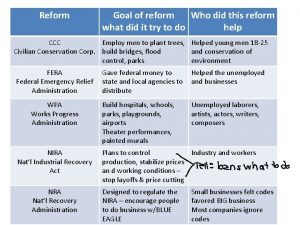Reform of the Civil Service in Ukraine some









- Slides: 9

Reform of the Civil Service in Ukraine – some comments from outside and on selected issues Dr. Dieter Schimanke Professor, Secretary of State (retired) Senior Expert (GIZ) Kyiv/Hamburg May 27, 2016 Professor Dieter Schimanke, NAPA, Kyiv, May 27, 2016

Main Trends in Public Administration Reforms in Europe Trends: (1) Decentralization: The central level keeps the global steering and is reduced to a monitoring function (controlling); the other levels have their own spheres of arranging programmes and conduct the operative tasks of public administration; (2) Strengthening the Local Self-Government/Administration: the principles are listed in the European Charter of the Council of Europe ratified by Ukraine and many other European states; (3) The development of E-Government and intensive use of IT (Public Administration in the digital age); (4) Integration of managerial-economics into public administration in the framework of New Public Management; (5) Orientation towards results and quality of public service instead on formal output (6) Strengthening the integration of the citizens into the decisions (Transparency, Open Government, participation). Professor Dieter Schimanke, NAPA, Kyiv, May 27, 2016 2

Reforms of the Civil Service in Europe A colourful picture of common approaches and differences in the fields of: • Civil service systems • Status of civil servants • Recruitment and appointment practices • Internal and external mobility practices • Promotion systems. (Source: Per Laegrid, Lois Recasino Wise, 2015) Professor Dieter Schimanke, NAPA, Kyiv, May 27, 2016 3

Main Principles of Civil Service Public service is one of the key components of public administration. A legally well-designed and managed public service system enables the state to reach an adequate level of professionalism, sustainability and quality of public service in all parts of its administration and to provide better services to citizens and businesses. Modern, constitutional public service in a democracy is regarded as possible only when a set of conditions is in place: • separation between the public sphere and the private sphere; • separation between politics and administration; • individual accountability of public servants; • sufficient job protection, level of pay and stability, and clearly defined rights and obligations of public servants; • recruitment and promotion based on merit. Source: SIGMA (OECD), Paris, November 2014 Professor Dieter Schimanke, NAPA, Kyiv, May 27, 2016 4

The Law on Civil Service of Ukraine of December 2015 • Contents are mainly matching with the core approaches in Europe • The need and challenges of implementation • One or two civil services? The question of the civil service and the civil servants of the cities and communes (bodies of local selfgovernment) Professor Dieter Schimanke, NAPA, Kyiv, May 27, 2016 5

Fields of Implementation • The instruments of a merit-based civil service • Especially: recruitment and promotion • Performance measurement (performance appraisal; performance related payment – see next slide) • Education first, training second • The right-sizing of personnel Professor Dieter Schimanke, NAPA, Kyiv, May 27, 2016 6

The Salary Problem • • The level of the public salaries The instrument of bonuses A lession from Slovenia A principle out of the German Constitution (‚the traditional principles of the Civil Service‘ and the unchanged interpretation by the Supreme Court) Professor Dieter Schimanke, NAPA, Kyiv, May 27, 2016 7

The Civil Service and the Public Administration Reform • The Political concept of decentralization • The implication to delegate functions and responsibilities (decentralization) • The consequence to enlarge two resources on the decentralized levels: personnel and finances • Beside the fiscal decentralization: civil servants shall move with the functions and tasks Professor Dieter Schimanke, NAPA, Kyiv, May 27, 2016 8

Conclusion The Civil Service is the essential actor and part of the Public Administration Reform. Ukraine has done a significant step forward by adopting the Civil Service Law in December 2014. But the new contents and approaches must be implemented and filled in with life. Important fields are: Education (and training) to establish and enlarge a professional staff; implementation of all instruments of modern HRM; connection with other fields of public administration reforms (see the first slide – from decentralisation until citizen participation). Professor Dieter Schimanke, NAPA, Kyiv, May 27, 2016 9
 Transinvest service ukraine
Transinvest service ukraine State service of ukraine on personal data protection
State service of ukraine on personal data protection Civil rights webquest
Civil rights webquest Civil war causes
Civil war causes They say it only takes a little faith
They say it only takes a little faith God when you choose to leave mountains unmovable
God when you choose to leave mountains unmovable Ice cream countable or uncountable
Ice cream countable or uncountable Contact and non contact forces
Contact and non contact forces Fire and ice diamante poem
Fire and ice diamante poem Some say the world will end in fire some say in ice
Some say the world will end in fire some say in ice

















